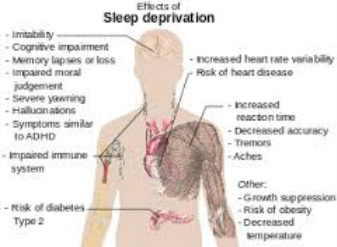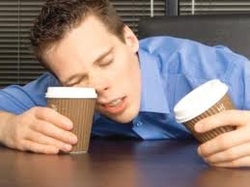 en.wikipedia.org
en.wikipedia.org Research has shown that teenagers naturally veer towards later bedtimes and are later to rise in the morning, possibly because of the hormonal changes that occur during puberty. However, electronic equipment accentuated this natural night-owl behavior.
This behavior drives parents mad. Here's a snippet (where Liliha takes a stray girl home for the night) from the novel I'm writing at the moment:
Liliha cut fruit to begin the day, glancing toward the kitchen door from time to time while waiting for Ellen to emerge from upstairs. She bit into a section of orange, savoring the sweet, acid flavor.
What job could she suggest for Ellen? Despite a suspicion of what Ellen was trying to escape from, stupid ideas came up one after the other. A dresser for catwalk models--Ellen lacked experience, a magician's assistant--lacked training, a food server in a prison--too attractive. Ellen would be likely to draw the men's eyes and their mind toward--. Don't even think that way.
Liliha flexed her shoulders. Use logic. What would her visionary persona suggest while occupying another body?
The difference lay in the fact that Liliha couldn't read Ellen's mind and find out what she really cared about. The girl had already resisted probing.
The cuckoo clock sang the same note nine times. Liliha didn't need to be at the tearooms until eleven. After a last wipe over the work surface, she headed through the hallway to the base of the stairs. The toilet flushed. Good, the bear would emerge from hibernation.
After waiting long enough to allow her guest to cover her supposedly naked body, Liliha shouted from the bottom of the stairs. "Tea or coffee?"
Silence. Then a hesitant, "Coffee please."
"Come and join me."
In the kitchen again, Liliha glanced up at a presence in the doorway. "Come and sit down." She deposited a steaming mug on the table and gestured to Ellen, who wore the same crumpled tracksuit. "You'll feel better after you drink that."
"Thanks." Face blotchy and hair tangled, Ellen kept her gaze averted.
"How did you sleep?"
"Good. Really. I haven't slept in such a comfortable bed for ages." Ellen glanced up, and then away.
Liliha spoke in a soft voice. "Where did you spend the night before?"
"Close to the station. It's handy because of the toilet. There's a wash basin there and everything." Ellen gulped her coffee and wrapped her hands around the mug. "'Course, you have to get in and out quickly, before the guard catches you."
"Thanks for the advice. It might come in handy."
 tribune.com.pk
tribune.com.pk Sleep deprivation is a significant hidden factor in lowering the achievement of school pupils, according to researchers carrying out international education tests. It is a particular problem in more affluent countries, with sleep experts linking it to the use of mobile phones and computers in bedrooms late at night.
The international comparison, carried out by Boston College, found the United States to have the highest number of sleep-deprived students, with 73% of 9 and 10-year-olds and 80% of 13 and 14-year-olds identified by their teachers as being adversely affected. Other countries with the most sleep-deprived youngsters were New Zealand, Saudi Arabia, Australia, England, Ireland and France.
This is another way modern technology affects our society.
I've never had trouble sleeping, and neither did my children. Back in the day, babies who slept through the night were referred to 'good sleepers', which apparently covered ever facet of their life. Sound thinking—it does.

 RSS Feed
RSS Feed






